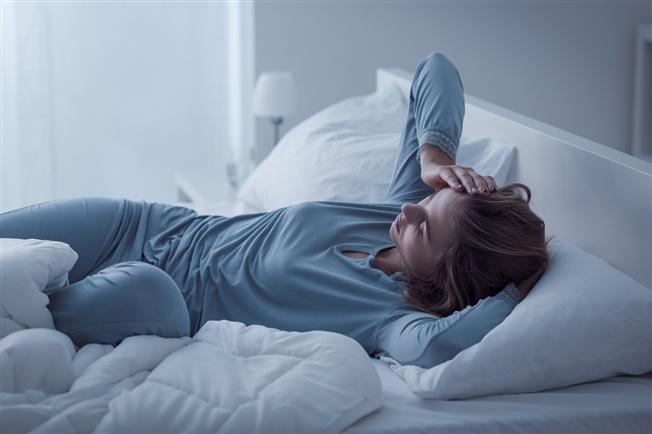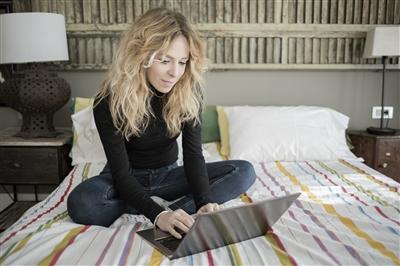How spending more time at home can interrupt healthy sleep habits

As we all get used to spending more time at home, we’re living, working, learning and playing in the same place. This can require us to change many of the ways we live our daily lives, but one side effect of more time at home that you may not have considered is an interruption to sleep patterns.
There are a number of reasons why spending more time at home may derail your otherwise healthy sleeping habits.
There’s less structure in the day
Without regular routines—going to work or school, extracurricular activities, errands to run—there is often less structure to your day. It can be tempting to let go of your sleep routine, too. With nowhere to be, you might forego setting an alarm or not worry about staying up later than usual to watch an extra hour of a TV show. During the day, you might be tempted to take a nap when you hit a mid-morning or afternoon slump.
“A nap every once in awhile is okay, but sleeping during the day or waking up much later than you usually do can make it harder to fall asleep at night. It can cause you to fall into a pattern that leaves you struggling to sleep a night but groggy during the day,” says Rochelle Goldberg, MD, director of sleep medicine services at Main Line Health.
As much as possible, try to stick to within 30 minutes of your normal wake-up and bedtime. And, if you need a nap, follow these tips to make sure it doesn’t interfere with nighttime sleep. But remember: You have a sleep routine for a reason and you will need that routine when your situation changes. If you have started drifting or napping, plan to work your way back to your regular sleep schedule at least a week before returning to your routine.
You’re drinking more alcohol
According to new data, the sale of alcoholic beverages in stores and online skyrocketed in March ahead of stay-at-home orders issued by states during the coronavirus pandemic. While these sales don’t indicate just how much we’re drinking at home, the rush to stock up indicates that, for some people, being stuck at home requires some extra spirits.

While most people claim that alcohol can help them sleep, the opposite is often true. Drinking in excess can affect your health in many ways, including making it more difficult to fall asleep and stay asleep. For the sake of your sleep and your overall health, limit yourself to no more than one drink per day, if that.
You’re spending more time in front of screens
It’s not uncommon to spend more time in front of your screen when you’re at home. Consider how much time you spend in virtual meetings or keeping up with emails when you’re not at the office, where in-person meetings or conversations can help solve many issues at once. Staring at multiple screens all day—whether it’s your computer, a tablet, phone or TV—can affect your sleep quality.
Unfortunately, there’s not much you can do to avoid screens. Instead, Dr. Goldberg suggests setting limits.
For example, promise yourself to shut down your computer, tablet and phone about three hours before bed. Use a blue light filter or blocker for these screens (and your e-book) in the evening. TV, in your family room, is okay as the screen is further away. Any interactions the last hour before bed should be pleasant and relaxing, and this includes TV shows and reading materials. As much as possible, avoid watching the news before bed.
You’re working in your bedroom
Working from home means working in a space you’re comfortable in, but you can be too comfortable. While it can be tempting to bring your laptop into bed and cozy up under the covers to conquer your to-do list, it’s best to find another spot in your home to get work done.

If you associate your bedroom with work or school projects, you might have a harder time drifting off to sleep with the thoughts of a stressful meeting or deadline looming. Reserve your bedroom for sleep so that, when you enter it at night, you can leave external stressors at the door.
You’re feeling stressed
During the coronavirus pandemic, many of us are dealing with the stress of uncertainty and juggling issues like physical and mental health, home schooling, caregiving from afar and worries about job loss. These stressors can occupy our mind at all hours of the day—including when you’re trying to rest and relax.
“It’s not uncommon to wake up in the middle of the night with a stressful thought or a worry and not be able to fall back asleep. In those situations, I recommend keeping a notebook next to your bed so you can write down these thoughts and revisit them in the morning. Remember: there’s not much you can do to change a situation in the middle of the night. The issue will still be there in the morning, and you’ll be well-rested and have a clearer mind to address it then,” says Dr. Goldberg.
Additionally, find ways that work for you to manage this stress. Exercise can help, and there are many apps for mindfulness and other meditation/relaxation techniques:
- Start a gratification journal. List five items for which you are grateful daily. Even little things, like hearing birds chirping or seeing the sun, can count!
- Name your biggest fear and write it down, then write down three to four things you can do to address it.
- Stay connected with family and friends virtually.
- Start a new hobby or cross something off your to-do list that you've always wanted to do like organizing a photo album or trying a new recipe.
Main Line Health serves patients at hospitals and health centers throughout the western suburbs of Philadelphia. To schedule an appointment with a specialist at Main Line Health, call 1.866.CALL.MLH (225.5654).